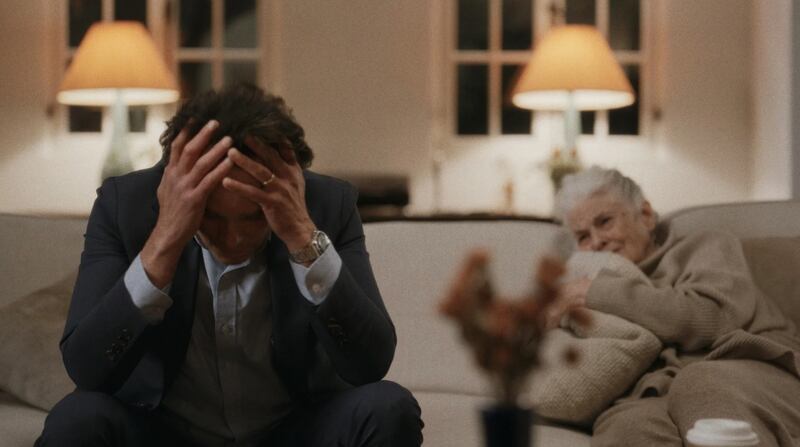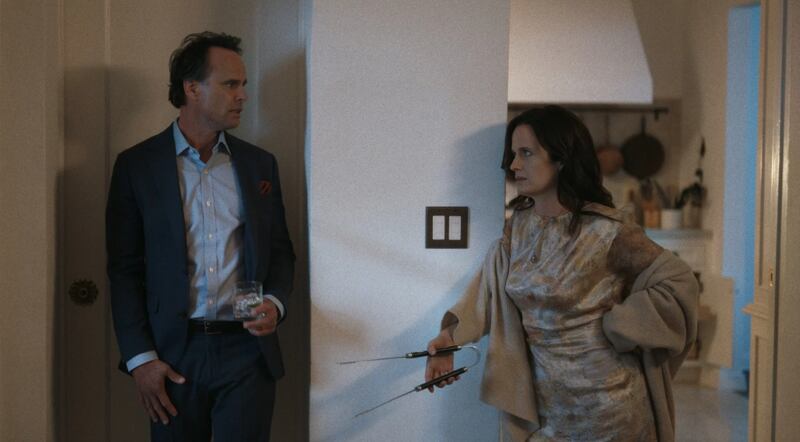There may be no greater fear in Hollywood than obsolescence, and that terror courses throughout The Uninvited (April 11, in theaters), an exceptionally funny and sad story about movie industry ambition, regret, and bitterness over things both abandoned and lost.
Set exclusively at a Los Angeles party thrown by a wheeler-dealer agent and his actress-turned-homemaker wife, writer/director Nadia Conners’ fictional feature debut is a manic comedic portrait of Tinseltown ego and avarice and a somber rumination on aging. Gracefully balancing its lighter and darker concerns, it’s a witty ride whose poignancy—like adulthood itself—sneaks up on you.
Rose (Elizabeth Reaser) stares at her face in a bedroom mirror, confessing to herself that she now understands the value of plastic surgery, since she never imagined she’d grow this old—or grow old at all. “I matter, I don’t matter,” she muses as she pulls her face back to smooth out her wrinkles, only to be interrupted by her husband Sammy (Walton Goggins), who chides her for being “so fucking disturbing.”
Rose and Sammy are hosting a shindig at their Hollywood Hills home, and they share a semi-hostile, if nonetheless affectionate, rapport, as is proven by their back-and-forth about what shirt and pants Sammy should wear, and Rose’s disappointment that their son Wilder (Roland Rubio) is experiencing Star Wars for the first time on his tablet in bed.

The Uninvited’s initial passages move at a brisk pace and include flashbacks to Rose preparing for her shindig and listening to a voicemail in which she’s informed that she didn’t get a part because the idea of her playing a six-year-old’s mother is—despite being the mom to a six-year-old—“tragic.” Amplifying the harried atmosphere is the recurring sound of a car horn.
When Rose investigates, she meets Helen (Lois Smith), who’s sitting behind the wheel of her Prius, puzzled over the fact that her clicker won’t open the driveway gate. Helen once lived in Rose and Sammy’s house and believes that she still does, and though Sammy has no time for this out-of-the-blue distraction, Rose takes pity on the elderly woman and brings her inside. While Helen is in the bathroom, Rose examines her address book and calls whatever numbers she can find in the hope that someone will come pick Helen up.
Before any of this can be resolved, guests arrive, and Sammy’s primary focus is Gerald (Rufus Sewell), a blockbuster director (and his number one client) whose latest franchise hit has grossed one billion dollars and, as he later admits while snorting cocaine with Sammy, convinced him that he’s a “high priest” or, perhaps, God Himself.

Additionally attending this get-together is Delia (Eva De Dominici), an up-and-coming actress with a knotty connection to Rose, and movie star Lucian (Pedro Pascal), who’s no sooner stepped through the front door than he’s apologizing to Rose—ostensibly as part of his sobriety program—for a profound past misdeed. Their dynamic suggests that they were once a couple, and the look on Sammy’s face when he sees Lucian whispering in his wife’s ear indicates that he isn’t totally comfortable with this reunion. Nonetheless, he plays along, doing his best to charm Lucian as Rose continues to care for the bewildered Helen.
As it turns out, Helen also had a husband named Sammy, and though she’s never completely lucid in the Uninvited, her comments are often pointedly apt regarding the circumstances at hand. Is she a ghost or, as Wilder’s nanny Tracy (Kate Comer) opines, a “witch?” No one quite knows, and Conners doesn’t waste time with concrete explanations, instead casting Helen as an unexpected and droll catalyst for turmoil, whether she’s accidentally locking herself in a powder room or stirring in Rose sorrow and terror about the transitory nature of life.
Further compounding Rose’s disorder is Lucian, whose attempt to rekindle their amour in private is swiftly, crushingly dashed by talk about the reasons for their separation. Sammy’s subsequent confession about his professional and personal missteps adds to the evening’s quiet chaos, compelling Rose to confront her frustration and fury over the opportunities—for love, acting projects, and a different life—she passed up and/or was denied.
The Uninvited is a morass of remorse, shame, and acrimony, and yet Conners routinely tackles her tale with biting humor, as when Sammy declares that he didn’t know they owned a toolbox, Rose responds by saying that her father would be rolling over in his grave over such a statement, and he snaps at her for attacking his masculinity.
Continuing his outstanding past year (which includes Fallout, The White Lotus, and The Righteous Gemstones), Goggins brings Sammy’s greed, selfishness, insecurity, and desperation to vivid life. Still, the film’s beating heart is Reaser’s Rose, whose victimhood—at the hands of a movie business that discriminates against her on the basis of age and gender, as well as a husband and ex-paramour who prioritize their own needs and desires above her—is exacerbated by her discontent with her maternal role, and the guilt she feels for feeling that way.
Conners eviscerates the industry for its shallow callousness without allowing The Uninvited to devolve into a screed, her writing consistently sharp, compelling, and just a touch enigmatic. Her characterizations are all full and complex, and aided by sterling turns from everyone involved, including a rakishly cocky Pascal, a sleazily brash Sewell, and a movingly muddled Smith as the film’s nominal title character.
It’s Reaser, however, who makes the material hum, embodying her protagonist with a density of charged and tangled thought and emotion that speaks volumes about the madness and misery wrought by her profession. Alternately frantic and poised, unstable and confident, enraged and mournful, she’s nothing short of terrific.
Rose’s night is complicated by Helen and Wilder’s temporary disappearances, as well as revelations about the theatrical production that first brought her acclaim—and sparked her affair with Lucian—and is now slated for a screen adaptation starring Delia. The Uninvited crescendos with literal and figurative deaths, the latter hitting as hard as the former, and Conners concludes her whirlwind saga on an uncertain but downbeat note that’s perfectly in tune with the jazzy and jagged action which preceded it. In this absurd and odious universe, the film contends, not everyone is invited to stay until the end of the party.
The post ‘The Uninvited’: Walton Goggins and Pedro Pascal Shine in This New Dramedy appeared first on The Daily Beast.



















